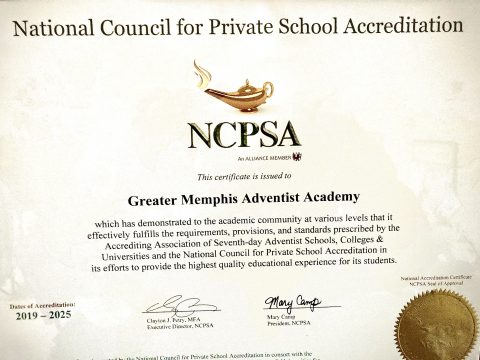The Greater Memphis Adventist Academy is operated and governed by the Office of Education, South Central Conference of SDA (Nashville, TN) in conjunction with the local Seventh-day Adventist church congregations. The school strives to maintain a leadership and administrative structure that is collaborative, efficient and effective.
Leadership and governance at the school is divided among three primary bodies: the School Board, the Office of Education, South Central Conference of SDA, and the Principal. The Board and Principal share the management of the school’s operations. The Board is primarily responsible for financial, fiscal, and legal matters, while the Principal is responsible for pedagogical matters, although each supports the efforts of the other in various ways. The South Central Conference of SDA Office of Education provides guidance and supports teacher development. The Principal works to facilitate communication between the different governing bodies, provides the logistical structure required for safe and effective operation and implements the policies and recommendations of the Board and the Office of Education.
Greater Memphis Adventist Academy is accredited by the National Council for Private School Accreditation and the Accrediting Association of Seventh-day Adventist Schools, Colleges & Universities.
The GMAA School Board represents the legal and corporate entity of the school and is responsible for overall governance, long range and strategic planning and for ensuring the financial vitality of the school. The Board meets monthly..
In addition to the Board’s executive and at-large members, the Board oversees a number of strategic board committees and task forces including, but not limited to, the: Executive Committee, Finance and Scholarship Committee, Personnel Committee, Food Academic and Surveys Committee, Constitution and By-laws Committee, Recruitment and Discipline Committee, Building Committee, Fundraising Committee.
The Executive Committee is comprised of the Board Officers, School Administrator, and local church pastors. It meets as needed to discuss and address issues arising in the areas of marketing, finance, strategic planning, staff, fundraising, and legal compliance. The Executive Committee is designed to respond to such issues quickly and/or to determine when issues must be addressed by the entirety of the Board.
In addition to the School Principal, the school employs a staff of professionals. Staff members include the Business Manager/Bookkeeper and Food Service Administrator. Their role is to provide leadership and coordination in their respective areas and to accomplish designated tasks. They also support and advance the work of the Board of Trustees and mandated committees from both the Board and the College.
Additional staff positions include: Administrative Assistant and maintenance personnel. Together with staff members, they support the faculty and the programs of the school
